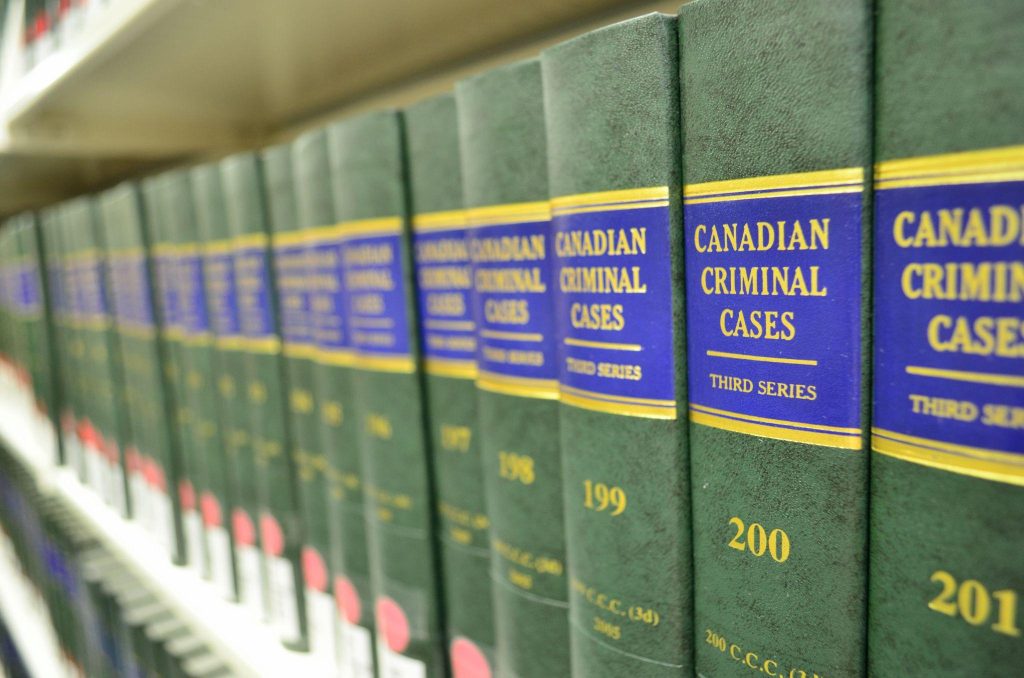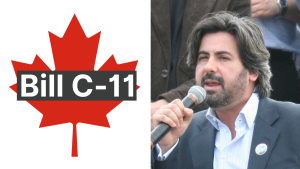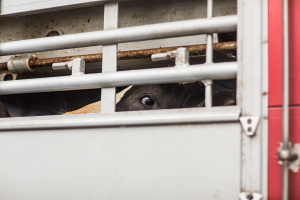
Image via Flickr (CC0 1.0)
On June 23, 2022, the Canadian government officially made Holocaust denialism a crime. This amendment to the Criminal Code was secretly tucked away in Bill C-19, Canada’s budget implementation act. Canadians hardly noticed it was there — we were too distracted by the budgetary provisions that we were promised would make life more affordable for us.
The following resolution has been added to Section 319 of the Criminal Code called ‘Wilful promotion of antisemitism.’
-
(2.1) Everyone who, by communicating statements, other than in private conversation, wilfully promotes antisemitism by condoning, denying or downplaying the Holocaust
(a) is guilty of an indictable offence and liable to imprisonment for a term not exceeding two years; or
(b) is guilty of an offence punishable on summary conviction.
Canada’s not alone in implementing Holocaust denial legislation. Some 17 countries, including Austria, Belgium, Germany, Israel, and Ukraine, also have laws against Holocaust denial.
Laws to suppress speech, no matter how cruel or vitriolic the speech may be, will only drive hateful beliefs further underground and turn criminals into martyrs.
In this particular case, the push to criminalize Holocaust denial in Canada was largely influenced by certain prominent Canadian Jewish advocacy groups, including the Centre for Israel and Jewish Affairs (CIJA), Canada’s largest Zionist and Jewish advocacy organization, and B’nai Brith, an organization known for targeting pro-Palestinian academics and activists under the guise of eradicating “racism, antisemitism, and hatred.”
Flawed audits claim antisemitism on the rise
Every year, B’nai Brith conducts an audit of antisemitic incidents in Canada which is then used as proof by governments to show that antisemitic incidents are on the rise. Yet, the audit, which B’nai Brith claims “serves as the authoritative document on antisemitism in Canada” pulls information from the very same government agencies that is later used by the federal government to prove that antisemitism is on the rise. The group is right about one thing: the audits are commonly cited by governments, non-profits, and the media, stoking a specific narrative and prioritizing pro-Zionist Jewish voices at the expense of others, including Palestinian activists, who the group asserts directly harms the Jewish community, and is therefore ‘racist’ and ‘antisemitic.’
In addition to collecting information from government and law enforcement, B’nai Brith also pulls data from their anti-hate app which allows users to self-report hate incidents. This is not without its own issues: self-reporting methodology is woefully unreliable. Respondents may exaggerate incidents, recall false or inaccurate events, or they may not be able to respond objectively, especially if it concerns a sensitive situation.
The audits are even more flawed when you consider what they qualify as incidents of antisemitism.
In last year’s report B’nai Brith reasoned that Palestinian activists are antisemitic based on their advocacy for Palestinian rights. They conflate anti-Zionism with hatred for Jews, which is used as evidence to support their claims that antisemitism is on the rise.‘If you’re not with us, you’re against us’ is the baseline measurement for what is deemed antisemitic. Despite the term being overused to the point of inanity, legislators still included it in the amendment — a grave mistake that will undoubtedly cause more harm in the long run.
Glaring flaws aside, the audits are still unquestionably parroted in the media and used as proof to push certain narratives and influence legislation.
Smear campaigns undermine credibility of anti-hate groups
B’nai Brith also engages in targeted cancellation campaigns which are conveniently ignored by the partners they work with.
One of their current targets is Khaled Barakat, a Palestinian-Canadian activist who they allege is a terrorist affiliated with the Popular Front for the Liberation of Palestine (PFLP). According to them, his association with the Samidoun Palestinian Prisoner Solidarity Network is a front for his terrorist activity. In a recent interview with Status Magazine, Barakat explains that the Samidoun Network is a registered Canadian non-profit that seeks to help imprisoned Palestinian political prisoners — many of whom are writers, students, activists, and journalists who support Palestinian resistance.
B’nai Brith evidently believes that supporting Palestinian rights is somehow not only incompatible with condemning antisemitism, but is in itself an example of antisemitism.
While Barakat’s alleged terrorist activity is not proven, this allegation continues to circulate far and wide by Jewish advocacy groups and is further propagated by the media.
B’nai Brith also tried to prevent academic Dr. Valentina Azarova from entering Canada because her work is focused on Israel’s occupation of Palestine. While they failed to do that, they did successfully pressure the University of Toronto to rescind their job offer to Dr. Azarova claiming that her position as Director of the International Human Rights Program would cause ‘substantial harm.’
To B’nai Brith, the actions of these activists and scholars are antisemitic and hateful, but others may view these targeted campaigns as an example of hate activity in itself.
CIJA, Canada’s leading Zionist advocacy group, also routinely conducts smear campaigns. The organization recently condemned a leftist rapper sporting a t-shirt that has the word “Destroy” emblazoned on it followed by an image of a swastika. The t-shirt is a replica of a 1975 design created by fashion designer Vivienne Westwood as a statement against fascism and Nazism. The original t-shirt is a part of the Metropolitan Museum of Art collection. CIJA called the shirt ‘atrocious’ and wrote letters of concern to the festival organizers and to the rapper calling for an apology and promise to never display ‘hateful symbolism’ again. The media picked up the story and ran with the antisemitism claims. But the missing piece was that CIJA conveniently ignored the fact that the shirt had the word ‘Destroy’ on it denoting that it is an antifascist message, not an antisemitic one.
CIJA also recently claimed UN Commissioner Miloon Kothari said “disturbing” remarks “promoting the antisemitic conspiracy theory” that social media is controlled ‘largely by the Jewish lobby’ in an interview with Mondoweiss. Kothari is also alleged to have propagated anti-Israel tropes that ‘call for the destruction of the Jewish state.’ If you listen to the full interview, it’s evident that Kothari’s remarks were deliberately distorted and taken out of context from the topic at hand. Kothari was not claiming that social media is controlled by Jewish lobbying organizations, but context doesn’t matter to CIJA. Kothari is now being pressured to step down from his role as UN Commissioner.
Free speech must necessarily include speech we do not like. It is through free speech that we allow everyone to voice their opinion, however vile we believe it to be. One person’s strongly held convictions is another’s hate speech. Free speech includes airing out hate-fuelled ideologies as a way to expose the rot, instead of letting it fester underground, giving more power to people who extoll harmful ideas. More speech is how we defeat hate. Not less.
As it stands, leading Canadian Zionist organizations, including CIJA and B’nai Brith, openly conduct smear campaigns while simultaneously working with government agencies to determine what they see as ‘hateful’ behaviour based on their own subjective views of what is hateful. This behavior is allowed—and even encouraged—yet the group’s targets, often composed of activists, academics, and independent journalists (and even government officials) are viewed as the dangerous, harmful ones.
All of these incidents point to one of the biggest questions we must ask ourselves: Who decides what is hateful? In these incidents, those deciding what is hateful wield the most power. This is a major concern that will undoubtedly lead to certain groups being unfairly punished over others.
Suppressing speech drives hate underground
Laws to suppress speech, no matter how cruel or vitriolic the speech may be, will only drive hateful beliefs further underground and turn criminals into martyrs.
Alberta Senator Paula Simons attested to this in the Senate when she spoke out about her opposition to the resolution days before it passed.
In her speech, Simons said criminal punishment for antisemitic statements gives “neo-Nazis and racists a platform to play the martyr, to wrap themselves in the rhetoric of free speech and to claim the public spotlight as faux defenders of intellectual freedom.”
Simons cites the example of Canadian Holocaust denialist Jim Keegstra.
Keegstra was a high school social studies teacher from Eckville, Alberta who taught his students that the Holocaust was a hoax for years until he was fired and later lost his teaching licence. After years of court proceedings, Keegstra’s case went all the way to the Supreme Court — twice. Keegstra was charged with ‘willful promotion of hatred,’ fined $5,000, received one year probation, and sentenced to 200 hours of community service.
Many might celebrate the charges, but it ended up having many unintended consequences. Keegstra gained national notoriety and became the hero of various hate-based organizations. For several years he made headlines across the country, and hate crimes in Alberta actually spiked at this time. Holocaust denial, however vile, must be defeated with more speech, not criminalized by the state.
Redundancy in hate speech legislation
Canada has already made hate speech a criminal offence. In the Criminal Code, hate speech is defined as speech that ‘incites hatred against any identifiable group.’ The punishment for hate speech is up to two years imprisonment—the same for antisemitism.
This offense is broad enough to include the ‘wilful promotion of antisemitism’ resolution, yet special interest groups still pushed for it to be added. With the government’s seal of approval, these lobbying groups are being granted more power to disproportionately silence and criminalize speech they don’t like.
If some interest groups are able to influence what can or cannot be said, a growing climate of self-censorship may fester and eventually bubble over contributing to the growing underground ecosystem of hate. Like Khaled Barakat and Dr. Azarova, marginalized groups, including activists and dissidents, may be at disproportionate risk of being punished for speaking out against powerful groups.
Free speech for all, or free speech for none
Free speech must necessarily include speech we do not like. It is through free speech that we allow everyone to voice their opinion, however vile we believe it to be. One person’s strongly held convictions is another’s hate speech. Free speech includes airing out hate-fuelled ideologies as a way to expose the rot, instead of letting it fester underground, giving more power to people who extoll harmful ideas. More speech is how we defeat hate. Not less.
Legislating these silencing tactics is inherently undemocratic. No country can claim to be free while criminalizing certain voices–especially if legislation is influenced by certain special interest groups.
Sneaking in a Criminal Code amendment in the budget act will only lead to more speculation by outlier groups, creating more animosity and division. This is how conspiracy theories take root and grow until they take on a life of their own. This tactic will have the unintended effect of providing ammo for hate-motivated groups and opportunists.
Canadians weren’t given the opportunity to vocalize their input or vote on something that directly impacts them. Not only does this undermine the democratic process, but it also threatens one of the fundamental things that make our country free and democratic. We run the risk of losing our voice, and that is the greatest threat of all.



